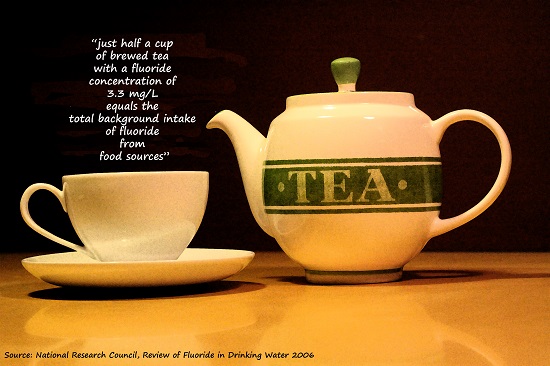Article by Dan Buckley
Buy a cuppa? Milk and sugar? Fluoride with that?
A new scientific study claims that tea made with fluoridated tap water is hazardous to health and that Irish people are most in danger.
Research published this month, in the Swiss-based International Journal of Environmental Research and Public Health, reveals excessive fluoride levels in tea in Ireland, and, say the researchers, provides the strongest evidence, to date, that the dietary fluoride intake in the general population can exceed the levels known to cause chronic fluoride intoxication.
The Republic of Ireland is the only European country with mandatory legislation, requiring artificial fluoridation of drinking water, and has the highest per capita consumption of black tea in the world.
The study is authored by an international team of researchers led by Irish scientist, Declan Waugh, some of whose previous findings have been rejected by the Irish Expert Body on Fluorides and Health, an advisory body that operates under the Department of Health.
The study assessed human exposure to fluoride, from the consumption of tea, by measuring the fluoride content in tea infusions from 54 different black-tea products sold in Ireland. It found all of the black teas had fluoride concentrations that exceeded the maximum enforceable level in drinking water, while also exceeding the maximum permitted level that requires labelling and safety precautions for bottled mineral water, under European regulations.
“These findings are important, because the European Food Safety Authority previously reported that drinking just two cups of tea per day, prepared with fluoridated water, in addition to other dietary sources of fluoride, can provide almost twice the recommended intake for adults,” said Mr Waugh.
“What we’ve shown is that the Republic of Ireland has one of the highest fluoride intakes in the world, due to our high consumption of tea, which is six times the global average.”
Original article Irish Examiner, March 10, 2016
Other sources: Fliuch
MDPI Switzerland











